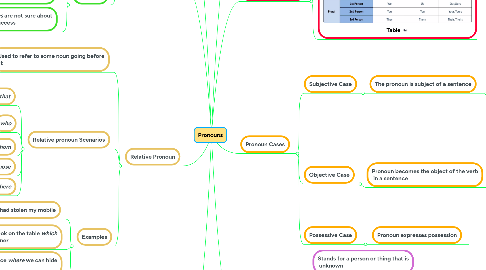
1. Definition
1.1. are used to refer
1.1.1. human beings
1.1.2. Animals, Plants
1.1.3. or things
1.2. example
1.2.1. I, You, She, It, Me, Her, Them, Their, Your, etc
2. Categorization Table
2.1. Table
3. Pronoun Cases
3.1. Subjective Case
3.1.1. The pronoun is subject of a sentence
3.1.1.1. Ex: *She* is falling asleep
3.1.1.1.1. <<-- Use of subjective case for subject of a sentence
3.1.1.2. Ex: It is *I* who stole the money
3.1.1.2.1. <<-- Use of subjective case after the verb is,are,was,were
3.1.1.3. Ex: Gary is taller than *I*
3.1.1.3.1. <<-- Comparisons between subjects of that are implied or understood
3.2. Objective Case
3.2.1. Pronoun becomes the object of the verb in a sentence
3.2.1.1. Ex: I called*him* to my house
3.2.1.2. Ex: I laughed at *her*
3.2.1.2.1. <<--Use of objective case for the object of a verb
3.2.1.3. Ex: Asking *him* to go was a big mistake
3.2.1.3.1. Use the objective case after infinitives and gerunds
3.2.1.4. Ex: She calls you more than (she calls) *me*
3.2.1.4.1. Comparisons between object of verbs
3.3. Possessive Case
3.3.1. Pronoun expresses possession
4. Indefinite Pronoun
4.1. Stands for a person or thing that is unknown
4.2. Examples of indefinite pronouns
4.2.1. Another, Anything, Something, Anyone, Everyone, Someone, Nothing, No one, Neither, either, someone etc
4.2.2. Both, few, several, more, some, all
4.3. Example sentences
4.3.1. *Someone* gives the beggar food everyday
4.3.1.1. The verb *gives* is singular
4.3.2. A *few* of the students were absent from the class
4.3.2.1. The verb *were* is plural
4.3.3. *None* was allowed to enter the auditorium
4.3.3.1. *was* is singular verb
4.3.4. *None* of the students have submitted their assignments
4.3.4.1. *None is considered plural and hence the plural verb *have*
5. Reflexive pronoun
5.1. Action performed by the subject reflects upon subject itself
5.1.1. Myself, Yourself, himself, herself, itself,ourselves, yourselves, themselves
5.2. Examples
5.2.1. They injured *themselves*
5.2.2. The doctor can understand his patient's case *himself*
6. Emphatic Pronoun
6.1. Puts emphasis on subject itself
6.1.1. Myself, yourself, himself, herself, itself
6.1.2. ourselves, yourselves, themselves
6.2. Examples
6.2.1. I *myself* can best explain it
6.2.2. She *herself* is responsible for her actions
6.2.3. They *themselves* are not sure about the project's success
7. Relative Pronoun
7.1. Used to refer to some noun going before it
7.1.1. also know as antecedent
7.1.2. Who, Whose, whom, which, that, what, Where, when, whoever, whoso, whosoever, whichever, whatever, and whatsoever
7.2. Relative pronoun Scenarios
7.2.1. *Which* and *that*
7.2.1.1. are used to refer to a place, thing or idea
7.2.2. *who*
7.2.2.1. used to refer to a person performing an action
7.2.3. *Whom*
7.2.3.1. refers to the receiver of the action
7.2.4. *Whose*
7.2.4.1. Is used to show possession
7.2.5. *Where*
7.2.5.1. Is used to refer to a place
7.3. Examples
7.3.1. I saw the man *who* had stolen my mobile
7.3.1.1. I would like to meet the person *whom* everyone praised
7.3.2. Place the book on the table *which* is in the corner
7.3.2.1. The book *that* is on the table belongs to my friend
7.3.3. I know of a place *where* we can hide this stuff
7.3.3.1. There is the man *whose* bike you are driving
8. Demonstrative & Reciprocal Pronoun
8.1. Demonstrative
8.1.1. Points out the subject or object it refers to
8.1.1.1. This, That, These etc
8.1.2. Ex: *This* is the best phase of my life
8.1.2.1. Ex: *Those* were the days that were full of vibrancy
8.2. Reciprocal
8.2.1. One another
8.2.1.1. one another - refers to more than two subjects
8.2.1.2. EX: Students of this batch are united with *one another*
8.2.2. each other
8.2.2.1. refers to two subjects
8.2.2.2. EX: Shaila and preesha are associated with *each other*
